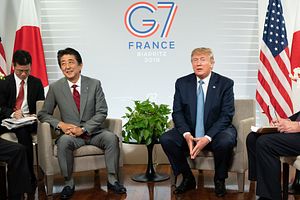As the world becomes a more multipolar system, with power shifting away from the established players to relative newcomers, it will have important consequences for the efficacy of existing international institutions. The Group of Seven (G-7), because it lacks a charter or secretariat and has no formal rules of membership, was always more of an informal club of developed democracies than a strong, cohesive organization.
This year’s summit, hosted by French President Emmanuel Macron in Biarritz, France, was notable in that it did not produce a communiqué for the first time since the group started meeting in 1975. On one level, this highlights the uniquely divisive influence of U.S. President Donald Trump’s unilateral foreign policy style. But the true challenge to the G-7 is structural: in the emerging multipolar world, it is especially likely to become irrelevant unless its membership changes to represent the voices of the rising powers, and address the concerns in regions outside of North America and Western Europe. Japan’s disillusionment with the G-7 was a likely outcome no matter who held the U.S. presidency in 2019.
At the 2017 G-7 Summit in Sicily, Trump refused to recommit the United States to the 2015 Paris climate, agreement leading to consternation among the other G-7 leaders. The United States was singled out in the final communiqué for its noncooperation. In 2018, at the Charlevoix summit, Trump called for Russia to be readmitted, and rescinded his endorsement of the final communiqué minutes after he left Canada. This year’s G-7 Summit has turned out to be another opportunity for Trump to wreak havoc on the international stage.
The limited one page document that was produced instead of a full communiqué only touched on trade, Iran, Ukraine, Libya, and Hong Kong. More concerning for Japan is what is absent – there is no mention made of the pressing security issues in East Asia. Nothing was mentioned of either North Korea’s recent short-range missile launches or China’s maritime expansion, which were originally scheduled for discussion on Saturday but had been pushed to Monday because more time was taken up than expected discussing tensions over Iran and Russia’s possible return to the G-7. From Japan’s perspective, this is doubly irresponsible behavior from the United States, as Trump created the very problems that this valuable time was spent addressing. That time should instead have been spent addressing the problems created by adversarial actors and rule-bending actions.
Given the geographic slant of the G-7 (a historical product of convening a club of “advanced democracies”), it is understandably difficult for Japan to get the other G-7 countries to consider its more “regional” concerns seriously. But such an attitude by the other G-7 leaders would be incredibly narrow-minded. Asia is such an integral part of the global economy that any North Korea incident or South China Sea trouble would affect economies around the world. With a potential slowdown in economic growth caused by Trump’s trade war with China, G-7 leaders do not have the luxury of subdividing “Asia” into an issue separate from the broader concerns of the world.
Japan did not get as much out of the G-7 as it had hoped for, but the summit was a key event for Japan’s diplomatic calendar. It set an unspoken deadline for a breakthrough on a U.S.-Japan trade deal, and a deal was indeed reached “in principle,” though the details still have to be worked out before the UN General Assembly meeting in late September and Trump floated the ambiguous threat of auto tariffs again. Furthermore, after Macron invited Iranian Foreign Minister Mohammad Javad Zarif to the summit, it set the stage for continued Japanese initiatives on mediating U.S.-Iran tensions.

































